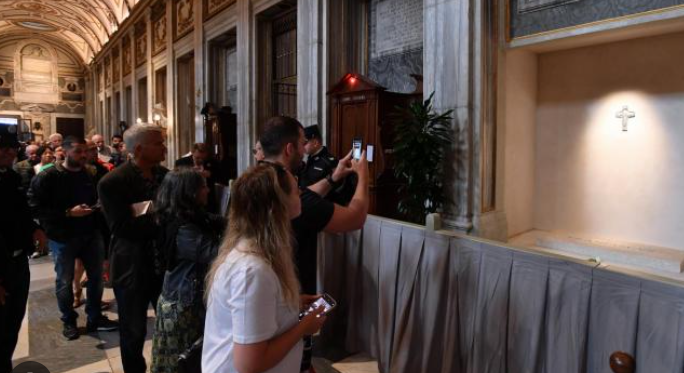MUNICH/SAN FRANCISCO (Reuters) – Apple Inc said it would pull some iPhone models from its German stores after a court there ruled on Thursday that Apple infringed a hardware patent of Qualcomm Inc and could no longer sell some models in Germany that contain a particular component.
A woman looks at the screen of her mobile phone in front of an Apple logo outside its store in Shanghai, China July 30, 2017. REUTERS/Aly Song
The ruling will not go into immediate effect if Apple appeals, judge Matthias Zigann told the court. Qualcomm needs to post a bond of 668.4 million euros, or $765 million, before it can begin proceedings to enforce the order, the court said in a news release after the hearing.
In a statement, Apple said it would pull some phones from its stores while it pursued an appeal.
“We are of course disappointed by this verdict and we plan to appeal,” Apple said in a statement. “All iPhone models remain available to customers through carriers and resellers in 4,300 locations across Germany. During the appeal process, iPhone 7 and iPhone 8 models will not be available at Apple’s 15 retail stores in Germany. iPhone XS, iPhone XS Max and iPhone XR will remain available in all our stores.”
Shares of Apple were up 0.4 percent at $161.61 in U.S. morning trading.
The case is part of a broader court conflict between the two, in which Apple has alleged that Qualcomm engaged in anticompetitive business practices to protect a monopoly on so-called modem chips, which help mobile phones connect to wireless data networks. The U.S. Federal Trade Commission has also sued Qualcomm over its business practices in a case set to go to trial in California next month.
Qualcomm has alleged in courts around the world that Apple violated its patents and has sought bans on iPhone sales in the United States and China.
The German case is Qualcomm’s third major effort to secure a ban on Apple’s lucrative iPhones over patent infringement allegations after similar efforts in the United States and China.
In Germany, Qualcomm is seeking a ban on some iPhones with chips from Intel Corp. The judge ruled that phones that contain a chip from Apple supplier Qorvo Inc violated one of Qualcomm’s patents around so-called envelope tracking, a feature that helps mobile phones save battery power while sending and receiving wireless signals.
“Competition authorities around the world have repeatedly found Qualcomm’s licensing practices unlawful, yet Qualcomm continues to try to achieve the same results through a campaign of patent lawsuits. These lawsuits have been largely unsuccessful, and at best would reduce innovation and raise prices,” Steven Rodgers, Intel’s general counsel, said in a statement.
Mike Baker, Qorvo’s chief intellectual property counsel, said in a statement that U.S. trade regulators had ruled that Qorvo’s chips did not violate the U.S. version of Qualcomm’s patent and that the chip’s inventor wasn’t allowed to testify at the German hearing.
“We believe our envelope tracking chip does not infringe the patent in suit, and the court would have come to a different conclusion if it had considered all the evidence,” Baker said.
Qualcomm was not immediately available for comment.
Qualcomm sued Apple in the regional court in Munich in July last year, seeking an injunction to halt some iPhone sales in Germany as well as monetary damages.
U.S. regulators found Apple infringed one Qualcomm patent but have so far recommended against banning some iPhone sales, but a Chinese court issued a sales ban on some iPhones earlier this month. Apple said its phones remain on sale and that it believes it has complied with the Chinese court’s order, but it also made changes to its iPhone software in the wake of the ruling.
Reporting by Joern Poltz in Munich and Stephen Nellis in San Francisco, writing by Emma Thomasson, editing by Tassilo Hummel and Bernadette Baum






Leave a Reply